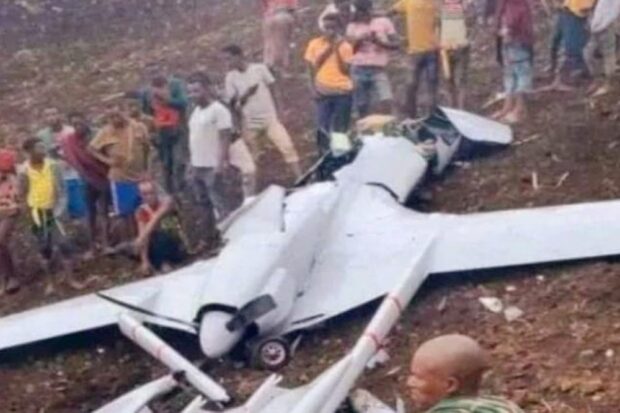In the rugged terrains of Ethiopia’s Oromia region, a Turkish-made Bayraktar TB2 drone was reportedly downed or crashed in late May, 2024. The incident occurred in the Horo Guduru Welega Zone, an area that has seen its share of conflict.
The loss of the Bayraktar TB2, a drone equipped with laser-guided MAM-L munitions, has sparked discussions on its operational effectiveness and resilience in combat zones.
The Bayraktar TB2 is a product of Turkish defense technology, developed by Baykar Makina. It has been in the spotlight for its role in various military operations across the globe. With a wingspan of 12 meters and a maximum takeoff weight of 650 kilograms, the drone is designed for extended missions, capable of flying up to 27 hours at altitudes reaching 27,000 feet. Its arsenal includes a suite of sensors for surveillance and targeting, and it can carry two MAM-L precision-guided munitions.
Despite the lack of official confirmation from Turkish and Ethiopian officials regarding the sale of drones, data from the Exporters’ Assembly indicates a significant increase in Turkish military hardware sales to Ethiopia, totaling nearly $95 million in the first 11 months of 2021.
The recent incident raises questions about the vulnerability of drones like the Bayraktar TB2 in active conflict zones. While the specifics of the drone’s loss are not fully known, it underscores the challenges faced by military technology in the field.
When Ethiopia acquired the Bayraktar, the United States government and Egypt expressed concern over Turkey’s sales of armed Bayraktar TB2 drones to Ethiopia, citing mounting evidence the government had used the weapons against rebel fighters.
Ethiopia’s air force has recently augmented its capabilities with the acquisition of a Sukhoi Su-30 fighter jet and a Turkish Akinci combat drone. The latter, a high-altitude, long-endurance UAV, is equipped with similar laser-guided MAM-L munitions and potentially the CATS electro-optical/infrared targeting system. These advancements signify Ethiopia’s commitment to modernizing its aerial warfare capabilities.
The incident involving the Bayraktar TB2 is a reminder of the complexities of modern warfare and the continuous evolution required in military technology to adapt to diverse and challenging environments.
Military drones have been a game-changer in the fight against terrorism in Africa, as they offer several advantages over traditional military operations. The impact of military drones on the African battlefield has been significant, as they have provided new capabilities to African militaries that were previously unavailable.
Ethiopia is also operating an unspecified number of Iranian-made Mohajer-6 unmanned aerial vehicles (UAVs), as well as a plethora of drones.

